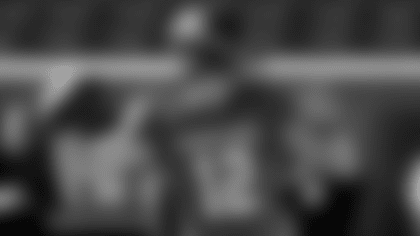Moderator: Les Steckel, offensive coordinator for the Tampa Bay Buccaneers. Coach Steckel, welcome to Tampa and to the Buccaneer organization.
Les Steckel: Thank you.
Moderator: This interview is called 'Your Turn' because we've asked our Buccaneers.com users to send in the questions that we will use to interview. So, what follows will be what our fans really want to know.
Rich, Tampa, Florida: Have the Buccaneers given the starting job to Mr. King, or will all of our quarterbacks go into the season with a chance to be the starter?
Les Steckel: From what I understand, Shaun King is the leading candidate and the favorite, and yet I believe that competition at this level is so important to improve every player and particularly every position. Going into camp, I understand that there is an open race there.
Ron, Clearwater, Florida: Are there going to be more offensive line stunts, such as pulling the guards and tackles?
Les Steckel: Well, we really believe strongly in a balanced attack and, in running the football, part of our scheme is what people refer to as the counter, which we refer to as a switch, or switch-trade, or switch-trade extra, and that's where we pull the guard and use either a tight end or a fullback instead of pulling the guard and the tackle.
Ruben, Corpus Christi, Texas: Warrick Dunn is probably one of the most talented players in the Bucs' offense. However, he is very different compared to Eddie George. How will his skills be used in your offense, and will Mike Alstott make a bigger impact on the ground since he is more of an Eddie George-style running back?
Les Steckel: Well, I think good coaches take advantage of the personnel they have, just as good managers take care of the resources that they have. We feel very blessed to have Mike Alstott and Warrick Dunn, and it's our desire to use both of these players and their capabilities. So, I think you may find one on the sideline and one on the field, and most often you'll see probably both of them on the field at the same time, trying to utilize their talents.
Rob, Clearwater, Florida: Last year, our wide receivers had problems getting separation from the defensive backs of our opponents. Can we look forward to more motion in the backfield from our receivers to allow them to get separation from the defensive backs?
Les Steckel: That's a good question. I think so often receivers have to be put in motion if they're having trouble getting off the line of scrimmage and we do utilize motions often, and shifts and unique formations to help them get off the line. And, of course, the depth of routes has something to do with that, as far as pushing the defender up the field vertically. We hope to do that; we understand that we have some great speed on the outside and we might as well take advantage of that while we can.
Calvin, Scottsdale, Arizona: In Tennessee, your offense found great success with Steve McNair's running. As Shaun King gets more comfortable as a starter, do you envision using him the same way?
Les Steckel: Well, Steve had that reputation from time to time. I think probably Buc fans remember the great run he had for us to put the icing on the cake when we were playing them on that Sunday night game. But Steve really was utilized most often with rollouts and dashes, as we refer to them, and play action passes where we try to get outside the defense and to the perimeter. So, we really didn't ask him to run that often, except when we called quarterback draws, and I think Shaun is the same kind of athlete that can do those types of things. I'm not sure that anyone except Steve has that kind of size and foot speed in the National League. So, we're not expecting anything exceptional from Shaun in the running game. But we do ask him or whoever or quarterback will be to be that quarterback, to throw the ball and make the proper decisions.
Tim, Allentown, Pennsylvania: There has been much written about the fact that the chance to work with Tony Dungy was a big factor in drawing you to Tampa Bay. In addition, he has said that both your on and off-field philosophies are similar. Can you expand on this a little bit?
Les Steckel: Well, Tony is a very strong Christian, and I like to think that I am as well. I think our Christian faith is foremost and utmost in our values in life. That certainly has attracted the two of us together from time to time as coaches when we've been at the Senior Bowl and during pre-game warmups before games and that type of thing. I think to have the opportunity to work for a head coach whose values are very special like that gives me a tremendous opportunity in my career. Secondly, we believe in very similar values in winning football games. I think we concur, him being a defensive coach and myself an offense coach, that to be physical on both sides of the football and to give full-speed effort...those are small things but with great emphasis. We believe strongly in coaching and fundamentals and making our players better, and they certainly have shown that as the last four years have evolved here in Tampa.
Ozzie, Chicago, Illinois: After having some time to asses the current offense with the Buccaneers, what do you feel are the strengths and weaknesses of the offense and what will you do to respectively enhance or correct these?
Les Steckel: You know, I kind of hit the ground running, and I have not seen one play yet of the Tampa Bay offense. It's been my responsibility to bring an offense to Tampa and teach the coaches an offense, for which I'm very grateful. These guys have great attitudes and I'm blessed with good football coaches that can learn our system, and it will become the Tampa Bay system. Changes from what we did from Tennessee will simply be the utilization of the talents that we have and I understand that we do have some players here that are very capable of making the big play, like a Warrick Dunn. So we have to utilize their skills and I think that's the challenge of a coach.
Mike, St. Louis, Missouri: ESPN noted last season that the Quarterbacks for the Buccaneers (Dilfer, Zeier, and King) all seemed to play similar styles. The hypothesis was that the offensive scheme only allowed short passes. Will the new offense highlight longer passing?
Les Steckel: Well, fans always like the long touchdown bombs. And yet, I think that when you play the game, you have to recognize that you only get so many cracks at moving the football. Usually, you average 60 to 65 plays a game, and I believe that stretching the field vertically with the speed we have would be a wise thing to do. And we do plan to do that but, as people say, you can't make a living throwing the 9-route, or the go-route, or the bomb, as fans would call it. I always tell people that three times four equals 12, and that's our job, to move the chain. Each week, when you play an opponent, some teams will allow you to push the ball down the field and others, based on their defensive design, will not. If we were playing the Tampa Bay Bucs on any given Sunday, I can assure you they don't allow the ball to be pushed down the field vertically. That's why they've given up very few points. So it depends on what the defense gives you, and then it's your job to take advantage from that.
Tommy, Lakeland, Florida: What is your favorite play?
Les Steckel: My favorite play? There are a lot of them that stand out. My biggest thrill in coaching, I believe, was when we ran a squadron play. We called the three wide receivers at the end of the game, and we sent the tight end out and he caught the ball and lateraled it to the running back who was coming up underneath and pushed the ball down the field. On the following play we threw the – as everybody referred to it – 'Hail Mary.' In 1980, we had to win the game to win the NFC Central Division and Cleveland had to win the game to win the AFC Central Division. We had 80 yards to go with 14 seconds on the clock and, based the design of that play, which we had talked about just briefly on the sideline. To see Ahmad Rashad catch the ball in the end zone for a spectacular play...I know it was rated the second most exciting play in Minnesota Viking history, but it would have to be my favorite player.
Vince, Boynton Beach, Florida: When you came to the Titans many people said you could bring out the best in Steve McNair. Steve got his team to the Super Bowl. How do you think this situation compares to the Bucs' young QB and does he have the same potential as McNair?
Les Steckel: Again, my assessment of Shaun King, from physically watching him play, would be unfair, because I haven't. I can tell you this, I recruited Kordell Stewart out of high school as an option quarterback. After one year, I was asked to teach him to be a drop-back quarterback, which was so foreign to him. He had great resistance against it, but fortunately, by the time Kordell left college he was one of the top quarterbacks and he led the Big Eight conference at that time in total offense. There have been a lot of great players – Gale Sayers, Barry Sanders, many, and yet he led the offense in the history of the league in college. So, he improved, Steve McNair has improved, and a player like Shaun King, who right now has the NCAA record for the most proficient quarterback, as far as his rating, tells me that there's tremendous potential here. I'm looking forward to working with him, as well as the other two that I've had the fortunate opportunity to work with.
Richard, Fairfield, Ohio: How do you propose to counter opposing defenses stuffing "the box"?
Les Steckel: A lot of times we faced that in the three years with the running game we had with Eddie George (at Tennessee) . Too often, there'd be one or two too many in 'the box' as you're referring to, to stop the run game. When that occurs, we found (it was successful) to run counter plays, either off the play action game or just counter plays in general, and certainly giving our receivers one-on-one opportunities on the outside and having a good protection scheme so that the quarterback would have time to push the ball downfield. We see that often and we hope to have some answer for it this fall, as well.
David, St. Petersburg, Beach: Is the use of the two-tight end formation based on coaching philosophy, or is it based on the players that you've had available in the past. And should we expect to see that formation utilized often in your offensive scheme.
Les Steckel: It's two-fold. We were very blessed to have Jackie Harris, who was here with the Bucs at one time, and Frank Wycheck, not to mention Mike Roan, and a young guy, Larry Brown, that we picked up last year. So we felt like our personnel would allow us to continue doing what we had done previously, before Jackie arrived, with Mike Roan and Frank Wycheck. When Jackie came on the scene and learned our system, that made it even more special to do what we did. Good coaching exercises the right to use the personnel that we have. Right now, presently, we feel like Warrick Dunn and Mike Alstott are two great offensive weapons, not to mention a few of our receivers. We will certainly employ that, because we've found in the past that with two tight ends, with a different shifting and motion that we have used over the years, you can get the defense in the right alignment. It's going to take some teaching and coaching and familiarity, but if we don't have those people on our football team, certainly we have to move in a different direction.
William, St. Petersburg, Florida: This past season, we saw how Warrick Dunn could be dangerous in the passing game. We also saw in past years how dangerous he could be in the running game. My question is, in your offense, how do you get him back to being a dangerous running back as well using his explosiveness as a receiver.
Les Steckel: Good question. Warrick is a talented athlete who can do most of everything in football. In offense, there's really only two basic things you do...you either run it or pass it. You'd like for him to be at the end of both of those. By putting him in the backfield in certain formations and alignments and getting him the ball to use his speed would be a tremendous asset to our team, and we plan to do that. As far as a receiver, he can catch the ball coming out of the backfield, we can line him up as a wide receiver and utilize his talents and skills there by just running the quick game or the deep game or screen passes with him. We're excited about his capabilities and are hoping to utilize them.
Rey, Tampa, Florida: Will you be working one-on-one with Shaun King this off-season to further develop himself as a quality starting quarterback or will that be left strictly to Clyde Christensen?
Les Steckel: Fortunately, when you're a coordinator, you have to have a hands-on experience with most of your players, but particularly the quarterback. Knowing Clyde Christensen as I think I do, the working relationship with Shaun will be outstanding, along with other quarterbacks as well. This offseason, we're hoping to do just that. Presently, we're just here in the middle of March and we're just starting to put in the offense. Until all of us really have a great grasp of the offense, we're not going to be able to convey that to our players. It's going to be a tedious process, but once we get to training camp, we're hoping to move forward. So we have a lot of work to do in a short time.
Jake, Tampa, Florida: Are we going to see Shaun King roll out and have an option like you did with Steve McNair. If so, how and how much?
Les Steckel: Again, we ran quite a few play-action passes during a ballgame...we average nine or 10 play-action passes a game. Of those, I would say 40% of the time Steve was rolling out. Shaun has shown, from what I understand, a great ability to throw the ball on the run. When you have a quarterback of that nature, it's wise to take advantage of their strong points, so I'm sure you can look forward to that.
Dwight, Canoga Park, California: How do you plan to boost the offensive players' confidence when they have to practice against the league's best defense?
Les Steckel: That's a great question, and we've already addressed that subject as a staff. As I told them, our job is to beat every defense in the National Football League but ours. We don't need to game plan and work overtime to beat our defense, which is a unique one and one we will rarely face on a given Sunday. But I think that because of the times I've had to prepare for this defense, and fortunately we've been victorious – not because of me so much but because of our players – I think we're familiar with what they do. Some of the strategies we used against Tampa on those given days we will currently employ in our basic offense. But our main job is to beat everybody but the Bucs' defense.
Mike, St. Petersburg, Florida: How much control and empowerment will you be given in calling offensive game plays?
Les Steckel: From what I understand, Coach Dungy is the head coach and, being in the Marine Corps for 30 years I understand what it is to follow orders. But I know that Coach has hired me with the understanding that there is a lot of freedom as a coordinator. He recognizes that. He's been a coordinator in the league, and some times being interrupted can be a detriment. But certainly, because of his expertise on defense, you can be assured that I'm going to him from time to time during the course of the week and asking for his input because of his background. I welcome any time he can be of help to me, because, as I've shared with the staff, I need all the help I can get.
Ray, St. Cloud, Florida: Could you please explain your 'Green Zone' offense and how it can be used effectively for the Buccaneers?
Les Steckel: First of all, Ray, I want to thank you for calling it the 'Green Zone' offense. At least the last time I was at a stoplight, red told me to stop and green told me to go. Too often, we're defensive oriented and everybody's thinking 'red zone'. We use the term 'Green Zone' in offensive lingo, and we exercise certain designed plays. Once we cross the 30-yard line – the National Football League uses the 20-yard line as the red zone, or green zone if you will – we recognize it as the 30-yard line. Once we get to the 30-yard line, we kick into what we call our green zone offense. Not to be boastful, but as you probably know, two years ago we were the only team in 80 years of professional football to score every time we crossed the time. But, in our eyes, it was every time we crossed the 30. That's our approach, and we have certain philosophical approaches to that. At this time, I can't give you any secrets, but I trust you will be watching us closely this fall.
James, Tampa, Florida: What do you think of the way some teams have used the short screen passes with line motion to try to get the ball into the hands of their speed guys? And could we possibly be seeing anything like that?
Les Steckel: To some degree, we can. I know in college football, people see the college screens. The rules state that the lineman can go downfield prior to the pass of the football. That's not the case in the National Football League, so you don't see as often those kinds of screens that you'd like to run with fast people like Warrick Dunn, in that the design of the play, because of the rules, doesn't allow it. But we are going to utilize Warrick outside and as a running back with the screens and are hoping to give us a chance to add some explosive plays.
Rodney, Haymarket, Virginia: I'm curious how your training and experience in the Corps translates to your coaching style and techniques.
Les Steckel: I can tell you, Rodney, you might have passed through Quantico, Virginia or Paris Island. Being a Virginia guy, you know where Quantico is. There are really some basics that football has and life has that haven't changed. Something that we really believe in, that the Marine Corps teaches as well as football, is discipline. I think we can take it one step further and call it self-discipline. We're all creatures of habit, and as coaches, if we can get our players during practice situations to do things over a period of time, and they believe in them, then that becomes second nature once your in combat or playing on a Sunday afternoon. I think good coaching, as Coach Dungy has done here in the past, has carried over to the success they've had in the field. Without a doubt, esprit de corps is a special thing. We talk about teamwork, and it's tremendous when you understand what being unselfish is. I think the heart of the matter is that if you're a disciplined person you have a great chance to be successful, and particularly if you're a self-disciplined person.
Moderator: Coach Steckel, thank you so much for your time and for answering the questions of Buccaneers.com users.
Les Steckel: Thank you, and I just want to say to Buccaneers fans out there that we can't thank you enough for your support. I just ask you to be as loud as you were that Sunday night when we played down here. But just one challenge, as I'm sure you're challenging me to score more touchdowns. In Tennessee, we asked all of our fans to stand up and be the 12th man. I've never seen a professional stadium in my years in the league – and I started in 1978 – until last year, when you looked around and saw 65,000 people standing for the entire game. That's a challenge I just mention to our Bucs fans.





















